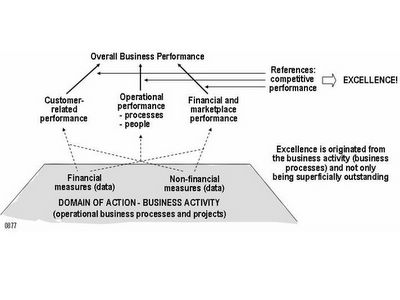Sustainable competitiveness in the organizational performance
Today all organizations – even the public civil service organizations – operate in competitive business environments. That increases the level and diversity of requirements for the quality – the degree to which the organization and its products with their inherent characteristics should fulfill the requirements of its stakeholders. Fulfilling certain minimum requirements is not enough, neither operating at the average level of performance, because in those cases there are better organizations that win the competition. The competitive organization should strive for something more. That is expressed in the modern quality approaches by aiming at performance excellence.
Excellence refers to the overall business performance of the organization taking into account relevant references (see attached diagram). Excellence implies that an organization’s performance exceeds a) its own targets, b) its competitors’ performance, and even c) has a good performance-related reference value (world-class benchmark) outside its own business branch.

Excellence refers to the overall business performance of the organization taking into account relevant references (see attached diagram). Excellence implies that an organization’s performance exceeds a) its own targets, b) its competitors’ performance, and even c) has a good performance-related reference value (world-class benchmark) outside its own business branch.

1 Comments:
Especially Tom Peters (www.tompeters.com) from USA has been many years very active in considering the excellence theme in his books. However, during the years his meaning for this topic has changed:
- In reach of excellence (T. Peters 1982)
- A passion for excellence (T. Peters 1985)
- The pursuit of WOW! (T. Peters 1994)
WOW implies ”...stepping out (individuals at all level in a firm and independent contractors) and standing out (corporations and other organizations) from the growing crowd of look-likes...”
Still recently Tom Peters said: “I still love the word per se – and what it connotes. I still love to talk about it. What could be cooler or more timely than the timeless (but ever-so-timely) topic of excellence at the enterprise or individual level?”
In fact, it is a paradox or dilemma to realize excellence. It should be
- both natural (unmade) and particularly planned and made
- both simple and complex
- both getting results and doing
- both every day and specific.
Old Chinese Tao word "wu-wei" (not-do) describes well the right approach to get excellence happen in a natural way. Modern Tao teachers may use an expression "excellent that is not outstanding".
Post a Comment
<< Home